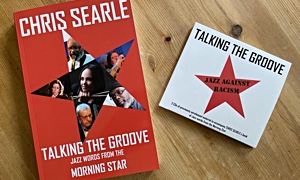Home » Jazz Articles » Book Review » Fusion Books: Running the Voodoo Down & Power, Passion and Beauty
Fusion Books: Running the Voodoo Down & Power, Passion and Beauty
 Philip Freeman
Philip FreemanRunning the Voodoo Down: The Electric Music of Miles Davis
Backbeat Books
ISBN 0-87930-828-1
2005
Some 35 years after fusion's meteoric rise, scholars can approach the movement with some measure of academic gravity. Two books discuss in great depths the father and one son of this oft-maligned genre.
Philip Freeman's book is a wonder. A look at 20+ years of Miles Davis' career, Freeman adds a substantial tome to the writings about Davis that usually focus on everything that happened before this period. But the substance is in the detail and analysis rather than heft. At under 250 pages, with index, Running the Voodoo Down is a compelling page turner that doesn't overwhelm.
This is mainly accomplished by two very important choices made by the author. First, he forewent the inclusion of any interviews, only briefly quoting sections of Miles' autobiography. Without pages spent quoting the dozens of relevant participants, the book is given over to detailed, often extremely insightful personal analysis of the albums and recording sessions and, most importantly, where Miles fit in during the various time periods.
The second choice Freeman made was to present the book as a series of interrelated essays rather than as a linear history. This creates some repetition of ideas but rather than becoming tedious, it serves to reinforce certain concepts the author considers vital to understanding Miles' music. Some individual chapters too are inspired reading: a segment linking Miles, Jimi Hendrix and Sly Stone; one on the relationship between Miles and producer Teo Macero (which provides a new perspective on many of the albums discussed); an entire chapter devoted to bassist Michael Henderson, who in many ways, as is made evident, was as important as Miles to the development of this period; and an investigation into Miles' use of the guitar - from Joe Beck to John McLaughlin to Pete Cosey to Mike Stern.
A book like this, which places the burden of proof squarely on the author, requires astute thinking. Freeman's analyses are remarkable, dispelling outmoded notions and creating links that seem obvious after he expounds on them. Even for those whose interest in Miles might wane after his temporary retirement will fly through the book, so consistent is the vision that Freeman presents.
 Power, Passion and Beauty: The Story of the Legendary Mahavishnu Orchestra
Power, Passion and Beauty: The Story of the Legendary Mahavishnu Orchestra
Walter Kolosky
Paperback; 313 pages
ISBN 0-9761016-2-9
Abstract Logix Books
2005
One of the big three groups to have been spawned by Miles' electric period (all of which Freeman somewhat dismisses as being part of any fusion lineage) was John McLaughlin's Mahavishnu Orchestra. Uber-fan Walter Kolosky has taken a stab at defining what it was about the band and its members that make them so enduring.
His approach is the opposite of Freeman's. Kolosky spent countless hours interviewing not only the original band but those related to them business-wise and any musician who might have been influenced by them. This makes for an astounding volume of source material and lots of delicious detail on albums and concerts and even their acrimonious breakup after only a few short years.
However patience and dedication is required to mine this ore. Kolosky's presentation is poorly conceived and executed. There are too many quotes and they are not connected by any substantial narrative flow. They are also offset from the text and various responses on the same topics are presented together, creating a stilted read. The portions written by Kolosky frankly do not hold up very well on literary merits and there is very little substantive analysis presented. A better approach would have been less quoting and more writing.
The other issue with the book, one that to be fair Kolosky accedes to throughout, is that this is not an objective book. The subtitle is "The Greatest Band That Ever Was and Kolosky, particularly through quote after quote about how incredible the band was, is doing his best to convince everyone. Mahavishnu was great but a little less gushing could make for an easier and more dignified read.
It would have been fascinating to read a Freeman-penned book on the same topic. Fans will buy this book anyway and eventually will pan some gold from it but it will take commitment.
Note: After publication of this review, a reader forwarded a list of mistakes found in Philip Freeman's Electric Miles book. Some were troubling while some were subjective. While we hope a second edition will correct these errors, the overall thrust of the review remains applicable.
< Previous
Workin'
Comments
Tags
For the Love of Jazz
 All About Jazz has been a pillar of jazz since 1995, championing it as an art form and, more importantly, supporting the musicians who create it. Our enduring commitment has made "AAJ" one of the most culturally important websites of its kind, read by hundreds of thousands of fans, musicians and industry figures every month.
All About Jazz has been a pillar of jazz since 1995, championing it as an art form and, more importantly, supporting the musicians who create it. Our enduring commitment has made "AAJ" one of the most culturally important websites of its kind, read by hundreds of thousands of fans, musicians and industry figures every month.























